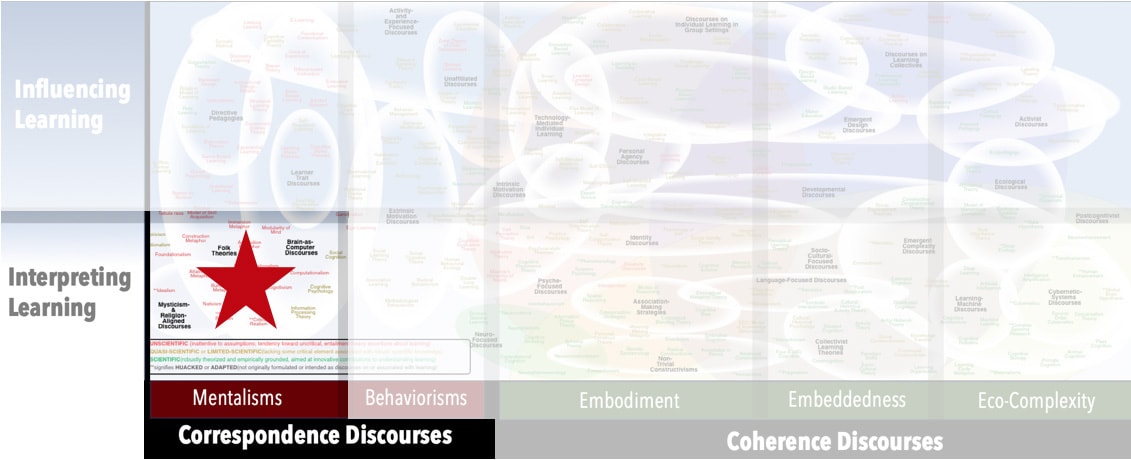AKA
Computational Theory of Mind
Focus
Sense-making activity in the brainPrincipal Metaphors
- Knowledge is … digitally encoded information
- Knowing is … activated networks
- Learner is … a computational system (brain)
- Learning is … elaborating possibilities through symbolic processing
- Teaching is … transmission (of information)
Originated
1940sSynopsis
Computationalism is more a philosophical positioning than a practical theory. Its grounding premise is that the mind is an information-processing system, and so perception, thought, consciousness, and so are all forms of computation. By implication, learning is seen as a matter of rule-based symbolic manipulations within neural networks. These notions are typically aligned with or subsumed within a grander perspective, such as:- Digital Physics Hypothesis (Conrad Zuse, 1960s) – the suggestion that the universe is fundamentally computational in nature, akin to a digital computer – meaning that the fabric of reality can be described as discrete bits of information that are processed according to algorithmic rules
- Mathematical Universe Hypothesis (MUH; Ultimate Ensemble Theory) (Max Tegmark, 1990s) – the suggestion that the physical universe is not merely described by mathematics, but it is mathematics – a perspective that proponents assert is bolstered by the success of mathematics in describing physical reality
- Simulation Hypothesis (Nik Bostrom, 2000s) – the suggestion that the “reality” one experiences is simulated, akin to a highly advanced virtual reality. Most versions assert that one’s experiences are artificial constructs created by an advanced agent.
Commentary
See Brain-as-Computer Discourses for a brief statement on prominent criticisms of the grounding premise (i.e., that the mind is an information-processing system) of Computationalism. Broader, more full-bodied critiques include:- Pancomputationalism (Gualtiero Piccinini, 2010s) – the cynical suggestion that everything is a computational system – which was offered as a critique of the tendency within Computationalism to conflate computational descriptions with actual computational systems. “Computation” is a specific kind of causal process involving the manipulation of symbols based on rules, and so not many physical systems qualify as computational systems.
Authors and/or Prominent Influences
Hilary Putnam; Jerry FodorStatus as a Theory of Learning
Computationalism is not intended as a theory of learning – but, insofar as it is taken up to inform discussions of learning, it is sufficiently aligned with Cognitivism to be subjected to the same criticisms.Status as a Theory of Learning
See Cognitivism.Status as a Theory of Teaching
See Cognitivism.Status as a Scientific Theory
See Cognitivism.Subdiscourses:
- Digital Physics Hypothesis
- Mathematical Universe Hypothesis (MUH; Ultimate Ensemble Theory)
- Pancomputationalism
- Simulation Hypothesis
Map Location

Please cite this article as:
Davis, B., & Francis, K. (2024). “Computationalism” in Discourses on Learning in Education. https://learningdiscourses.com.
⇦ Back to Map
⇦ Back to List
